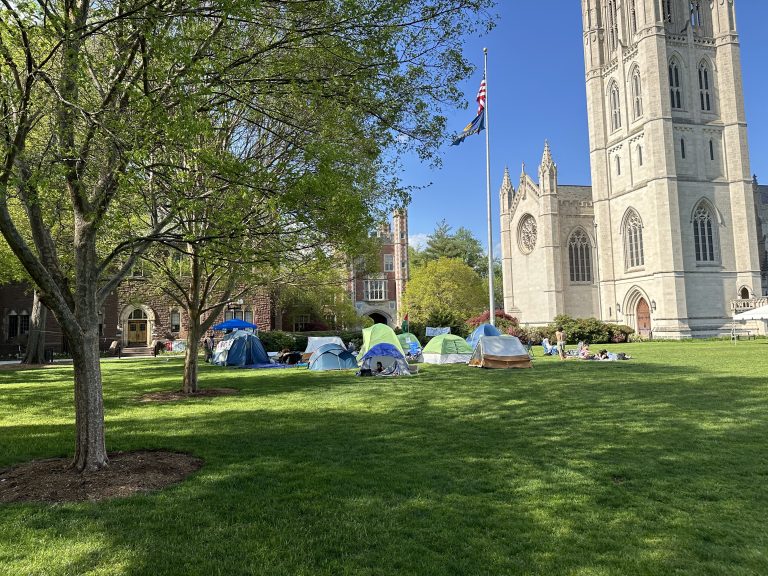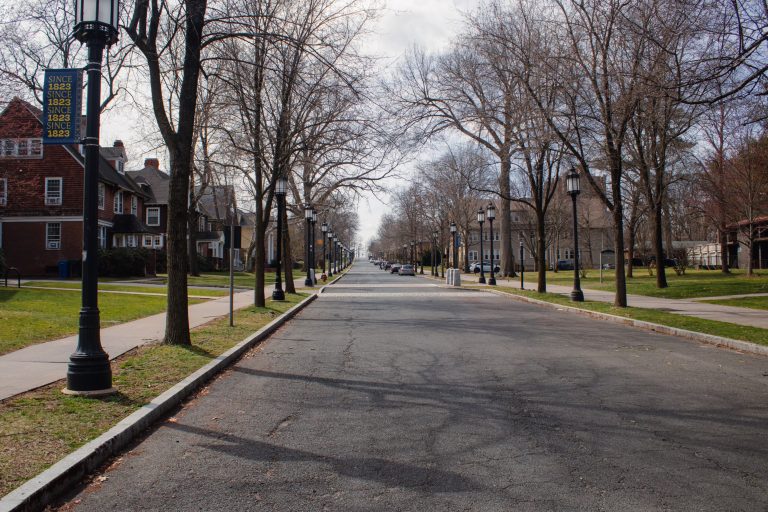ERIN GANNON ’19
MANAGING EDITOR
On Tuesday, Feb. 7, the Office of International Students and Scholars held an information session during common hour aimed at addressing the concerns of international students at Trinity regarding the recent Executive Order signed by President Trump on Jan. 27. According to College President Joanne Berger-Sweeney, this is just one of many ways Trinity is supporting international students amidst recent political turmoil.
Held in McCook Auditorium, the session featured opening remarks by Katharine Clair, Trinity’s International Student Advisor. Also in attendance were several representatives from Admissions and the Dean of Students Offices, including Dean Joe DiChristina, who also addressed the students briefly.
After the opening remarks, the room was opened up for discussion, giving a platform to the students in attendance to ask questions and air their concerns. One student remarked the apathy toward international affairs by non-international students, and the isolating affect it has on the international student population.
Shortly after the floor opened up for discussion, Attorney Dan H. Berger of Curran & Berger LLP, a law firm specializing in immigration law in Northampton, Mass., addressed the students in attendance via a Skype call. Berger briefly discussed the implications of the Executive Order for students from the seven countries it directly impacts, for students of other Muslim-majority countries, and for international students in general. Berger also explained why the immigration ban has been halted for the foreseeable future by the US Court of Appeals for the Ninth Circuit. He then answered a variety of student questions that ranged from clarifying legal jargon to the affects that the Executive Order may have on employment opportunities for current international students at Trinity and elsewhere in the US upon the time of their graduation.
“The goal of the event was to listen to international student concerns about life at Trinity and get some feedback as to how to support students better,” said Clair. “We already had this scheduled before the Executive Order came out so we thought that it would be a good time to have an immigration lawyer answer some questions and help alleviate some of the uncertainty that we know the international population is feeling.” The Skype visit by the lawyer was paid for by funds from President Berger-Sweeney’s discretionary budget.
Hamna Tariq ’20, a student from Lahore, Punjab, Pakistan, noted the helpfulness of the event. “It gave me a more informed perspective on the immigration policy and cleared several confusions and misconceptions,” she said.
Brii Kuz ’18, from London, England, attended the event to learn about how the Executive Order may impact her international peers from Muslim-majority nations, but received helpful information applicable to herself. “[Berger] briefly spoke about how it may be harder to stay in America once I graduate,” she said, “so it’s all up in the air now.”
The event was just one of a series of planned actions taken by the College in response to the Executive Order. “We are very lucky that our semester had already begun and we did not have any students stuck outside of the US,” Clair said. “While we are lucky in that respect, I do know that there is a general feeling of anxiety as to what the Order could mean in the future and whether there might be any other orders coming down the pipeline that would affect our students’ ability to work in the United States after graduation. It’s important for my office in collaboration with other departments on campus including Dean of Students and Student Success to provide extra support at this time and to keep students as updated as we can.”
Later in the week, Tripod staff sat down with President Berger-Sweeney to discuss how the College is currently responding and plans to respond to the political dissonance caused by the Executive Order. This event for international students was held in addition to President Berger-Sweeney writing a letter to the Trinity community addressing the immigration ban and signing onto a letter along with roughly 48 other college presidents asking President Trump to rescind or revise the ban.
President Berger-Sweeney does not intend to declare Trinity College a sanctuary campus. “It is a term that does not have a consistent definition,” she said. “I don’t like to make declarations that are not clear and pointed. Declaring the institution a sanctuary campus does not have any legal standing or, in my opinion, clear legal meaning.”
Additionally, Berger-Sweeney wants to avoid placing international students in a position that may compromise their safety. “Given some of the things we have heard and seen so far in the administration, there is the possibility that making a declaration like that doesn’t help the students who are affected by these immigration policies, and in fact may place the institution and those individuals as a target more in harm’s way.”
Berger-Sweeney stated that the most important things she could do right now is provide students with legal information and advice, as well as have conversations with Student Life Offices regarding international affairs, so that those offices are well-equipped to provide advice to students. Additionally, the Office of the Dean of Students has reached out specifically to undocumented students and students affected by the travel ban to address individual concerns and needs during this time. “I think things that we’re doing are so much more important than a declaration of a word that does not currently have a lot of meaning,” she said.
She also stated that several alumni have reached out to students affected by the ban to offer their services for free, an action that was organized through the College’s alumni network.
At the common hour event with Attorney Berger, Tariq posed a question of concern to her: if she were to go home to the summer, and the Executive Order reinstated and expanded to include Pakistan, would Trinity be able to help her or students in similar positions in any way? Berger-Sweeney stated that this has been a point of discussion among College administrators and administrators from Trinity’s peer institutions. Some of the options they have considered are allowing those students to make use of Trinity’s Study Away sites abroad while they are unable to travel, and also determining whether Trinity among peer Connecticut institutions could provide housing over breaks, so students wouldn’t have to go home and run the risk of not being able to return to the US.
“When there are issues that I think affect higher education, related to higher education or related to our students and how we are able to function, those are the things that I will speak up against,” President Berger-Sweeney said. “Things that are our fundamental values—exchange of ideas, inclusion and diversity, the true sincere belief that knowing and understanding the other helps all of us, and that we’re never going to be able to reach across divides if we don’t understand what other people are thinking and doing—I think that those are some of our core fundamental values as educators, and I will speak up when I think those issues are being trounced upon, and I thought the immigration ban was one of those issues.”
Thursday, June 6 2024
The Student Newspaper at Trinity College in Hartford, Connecticut








+ There are no comments
Add yours